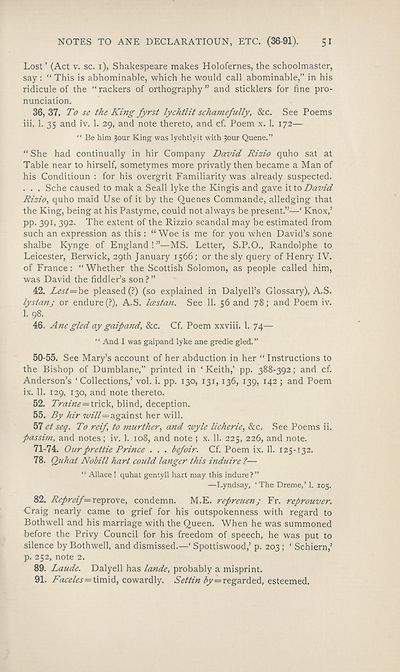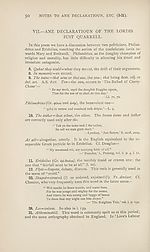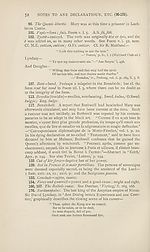Scottish Text Society publications > Old series > Satirical poems of the time of the reformation > Volume 2, 1893
(67)
Download files
Complete book:
Individual page:
Thumbnail gallery: Grid view | List view

NOTES TO ANE DECLARATIOUN, ETC. (36-91). 51
Lost’ (Act v. sc. i), Shakespeare makes Holofernes, the schoolmaster,
say: “ This is abhominable, which he would call abominable,” in his
ridicule of the “rackers of orthography” and sticklers for fine pro¬
nunciation.
36, 37. To se the King fyrst lychtlit schamefully, &c. See Poems
iii. 1. 35 and iv. 1. 29, and note thereto, and cf. Poem x. 1. 172—
“ Be him Jour King was lychtlyit with Jour Quene.”
“ She had continually in hir Company David Rizio quho sat at
Table near to hirself, sometymes more privatly then became a Man of
his Conditioun : for his overgrit Familiarity was already suspected.
. . . Sche caused to mak a Seall lyke the Kingis and gave \i\.o David
Rizio, quho maid Use of it by the Ouenes Commande, alledging that
the King, being at his Pastyme, could not always be present.”—‘ Knox,’
pp. 391, 392. The extent of the Rizzio scandal may be estimated from
such an expression as this : “ Woe is me for you when David’s sone
shalbe Kynge of England!”—MS. Letter, S.P.O., Randolphe to
Leicester, Berwick, 29th January 1566 ; or the sly query of Henry IV.
of France: ‘‘Whether the Scottish Solomon, as people called him,
was David the fiddler’s son?”
42. Lest=Y>e. pleased (?) (so explained in Dalyell’s Glossary), A.S.
lystanj or endure (?), A.S. Icestaii. See 11. 56 and 78; and Poem iv.
1. 98.
46. Ane gled ay gaipatid, &c. Cf. Poem xxviii. 1. 74—
“ And I was gaipand lyke ane gredie gled.”
50-55. See Mary’s account of her abduction in her “ Instructions to
the Bishop of Dumblane,” printed in ‘ Keith,’ pp. 388-392; and cf.
Anderson’s ‘Collections,’ vol. i. pp. 130, 131, 136, 139, 142 ; and Poem
ix. 11. 129, 130, and note thereto.
52. Traine=\.x\zY, blind, deception.
55. By hir wz7/= against her will.
57 et seq. To reif, to murther, and wyle licherie, &c. See Poems ii.
passim, and notes; iv. 1. 108, and note ; x. 11. 225, 226, and note.
71-74. Ourprettie Prince . . . befoir. Cf. Poem ix. 11. 125-132.
78. Quhat Nobill hart could langer this induire ?—
“ Allace ! quhat gentyll hart may this indure?”
—Lyndsay, ‘The Dreme,’ 1. 105.
82. Reprdf= reprove, condemn. M.E. repreuenj Fr. reprouver.
Craig nearly came to grief for his outspokenness with regard to
Bothwell and his marriage with the Queen. When he was summoned
before the Privy Council for his freedom of speech, he was put to
silence by Bothwell, and dismissed.—‘ Spottiswood,’ p. 203 ; ‘ Schiern,’
p. 252, note 2.
89. Laude. Dalyell has lande, probably a misprint.
91. Faceles = cowardly. Settin by— regarded, esteemed.
Lost’ (Act v. sc. i), Shakespeare makes Holofernes, the schoolmaster,
say: “ This is abhominable, which he would call abominable,” in his
ridicule of the “rackers of orthography” and sticklers for fine pro¬
nunciation.
36, 37. To se the King fyrst lychtlit schamefully, &c. See Poems
iii. 1. 35 and iv. 1. 29, and note thereto, and cf. Poem x. 1. 172—
“ Be him Jour King was lychtlyit with Jour Quene.”
“ She had continually in hir Company David Rizio quho sat at
Table near to hirself, sometymes more privatly then became a Man of
his Conditioun : for his overgrit Familiarity was already suspected.
. . . Sche caused to mak a Seall lyke the Kingis and gave \i\.o David
Rizio, quho maid Use of it by the Ouenes Commande, alledging that
the King, being at his Pastyme, could not always be present.”—‘ Knox,’
pp. 391, 392. The extent of the Rizzio scandal may be estimated from
such an expression as this : “ Woe is me for you when David’s sone
shalbe Kynge of England!”—MS. Letter, S.P.O., Randolphe to
Leicester, Berwick, 29th January 1566 ; or the sly query of Henry IV.
of France: ‘‘Whether the Scottish Solomon, as people called him,
was David the fiddler’s son?”
42. Lest=Y>e. pleased (?) (so explained in Dalyell’s Glossary), A.S.
lystanj or endure (?), A.S. Icestaii. See 11. 56 and 78; and Poem iv.
1. 98.
46. Ane gled ay gaipatid, &c. Cf. Poem xxviii. 1. 74—
“ And I was gaipand lyke ane gredie gled.”
50-55. See Mary’s account of her abduction in her “ Instructions to
the Bishop of Dumblane,” printed in ‘ Keith,’ pp. 388-392; and cf.
Anderson’s ‘Collections,’ vol. i. pp. 130, 131, 136, 139, 142 ; and Poem
ix. 11. 129, 130, and note thereto.
52. Traine=\.x\zY, blind, deception.
55. By hir wz7/= against her will.
57 et seq. To reif, to murther, and wyle licherie, &c. See Poems ii.
passim, and notes; iv. 1. 108, and note ; x. 11. 225, 226, and note.
71-74. Ourprettie Prince . . . befoir. Cf. Poem ix. 11. 125-132.
78. Quhat Nobill hart could langer this induire ?—
“ Allace ! quhat gentyll hart may this indure?”
—Lyndsay, ‘The Dreme,’ 1. 105.
82. Reprdf= reprove, condemn. M.E. repreuenj Fr. reprouver.
Craig nearly came to grief for his outspokenness with regard to
Bothwell and his marriage with the Queen. When he was summoned
before the Privy Council for his freedom of speech, he was put to
silence by Bothwell, and dismissed.—‘ Spottiswood,’ p. 203 ; ‘ Schiern,’
p. 252, note 2.
89. Laude. Dalyell has lande, probably a misprint.
91. Faceles = cowardly. Settin by— regarded, esteemed.
Set display mode to: Large image | Zoom image | Transcription
Images and transcriptions on this page, including medium image downloads, may be used under the Creative Commons Attribution 4.0 International Licence unless otherwise stated. ![]()
| Publications by Scottish clubs > Scottish Text Society publications > Old series > Satirical poems of the time of the reformation > Volume 2, 1893 > (67) |
|---|
| Permanent URL | https://digital.nls.uk/107427563 |
|---|
| Attribution and copyright: |
|
|---|
| Description | A collection of over 100 Scottish texts dating from around 1400 to 1700. Most titles are in Scots, and include editions of poetry, drama, and prose by major Scottish writers such as John Barbour, William Dunbar, Gavin Douglas, and George Buchanan. Edited by a key scholarly publisher of Scotland's literary history, and published from the late 19th century onwards by the Scottish Text Society. Available here are STS series 1-3. |
|---|

